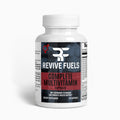Mind enhancement supplements, commonly referred to as "nootropics," have gained widespread popularity among people looking to improve focus, memory, and cognitive performance. From students to professionals, many are turning to these supplements in hopes of boosting mental clarity and productivity. But do they actually work? Let’s explore the science behind mind enhancement supplements and whether they live up to their claims.
1. What Are Mind Enhancement Supplements?
Mind enhancement supplements, or nootropics, are substances designed to enhance cognitive functions such as memory, attention, creativity, and motivation. These supplements can be natural or synthetic and are often used by individuals looking to improve mental performance in demanding situations.
Common nootropic ingredients include:
- Caffeine: Known for boosting alertness and reducing fatigue.
- L-Theanine: Often paired with caffeine, it promotes relaxation without drowsiness, improving focus.
- Ginkgo Biloba: Believed to improve blood circulation to the brain, supporting memory and cognitive function.
- Bacopa Monnieri: An herb known to improve memory retention and learning ability.
- Omega-3 Fatty Acids: Essential for brain health, supporting memory and cognitive development.
- Rhodiola Rosea: An adaptogen that helps reduce mental fatigue and improve endurance during stressful situations.
2. How Do They Work?
The science behind nootropics varies depending on the specific ingredients, but most mind enhancement supplements work by influencing brain function in one or more of the following ways:
-
Increased Neurotransmitter Activity: Some nootropics stimulate the release of neurotransmitters, which are chemicals that transmit signals in the brain. For example, caffeine blocks adenosine, a neurotransmitter that causes drowsiness, resulting in improved alertness.
-
Improved Blood Flow to the Brain: Ingredients like Ginkgo Biloba are thought to improve circulation, which delivers more oxygen and nutrients to the brain, enhancing cognitive performance.
-
Enhanced Neuroplasticity: Certain nootropics, such as Bacopa Monnieri, are believed to support neuroplasticity, the brain's ability to adapt and reorganize itself. This can enhance learning, memory, and problem-solving abilities over time.
-
Stress Reduction: Adaptogens like Rhodiola Rosea help the brain and body adapt to stress, improving mental clarity and focus during periods of physical or emotional strain.
3. What Does the Research Say?
The effectiveness of nootropics depends on the specific supplement and the quality of research supporting it. While some mind enhancement supplements have demonstrated promising results, others have limited or inconclusive evidence. Here’s a look at the science behind some common nootropics:
-
Caffeine: One of the most well-studied nootropics, caffeine is known to improve focus, alertness, and reaction time. Studies show that moderate doses of caffeine can enhance cognitive function, especially when combined with L-Theanine to counterbalance the jittery effects.
-
Bacopa Monnieri: Some clinical trials suggest that Bacopa Monnieri may improve memory and cognitive performance, particularly in older adults. However, the effects may take several weeks to become noticeable.
-
Ginkgo Biloba: While widely used for memory enhancement, studies on Ginkgo Biloba have shown mixed results. Some research indicates it may help improve memory in older adults, but its benefits for younger individuals are less clear.
-
Omega-3 Fatty Acids: Omega-3s, particularly DHA, are essential for brain health and have been linked to improved cognitive function, particularly in aging individuals or those with deficiencies. However, their impact on short-term mental enhancement in healthy adults remains uncertain.
-
Rhodiola Rosea: Research suggests that Rhodiola Rosea can reduce fatigue and improve mental performance in stressful situations, making it useful for individuals under high cognitive demand. However, more long-term studies are needed to confirm its broader effectiveness.
4. Do They Really Work?
The effectiveness of mind enhancement supplements largely depends on the specific supplement, dosage, and individual response. Some ingredients, like caffeine, have been consistently proven to improve cognitive performance, while others, like Ginkgo Biloba, may have limited or variable effects.
It's also essential to note that most nootropics don’t produce drastic, immediate results. Many work subtly and over time, enhancing brain health and cognitive function gradually. Consistency in use and the right combination of supplements can make a difference, but they’re not a quick fix for cognitive enhancement.
Moreover, factors like diet, sleep, exercise, and stress management play significant roles in mental performance. Nootropics are best seen as a complementary tool rather than a replacement for a healthy lifestyle.
5. Are There Risks?
While many mind enhancement supplements are derived from natural ingredients, they aren’t without risks. Some individuals may experience side effects such as anxiety, headaches, or digestive issues when using certain nootropics. Additionally, the long-term effects of many of these supplements are still unknown, particularly for newer synthetic nootropics.
It’s important to consult with a healthcare professional before starting any mind enhancement supplement, especially if you have pre-existing conditions or are taking medication. Not all supplements are regulated or tested for safety, so choosing high-quality, reputable brands is crucial.
Mind enhancement supplements can offer cognitive benefits, especially when combined with a healthy lifestyle. While some nootropics like caffeine and Omega-3s have solid scientific backing, others still need more research to confirm their effectiveness. The key to success is choosing supplements that align with your mental performance goals and using them as part of a balanced approach to brain health. Remember, no supplement can replace the fundamental pillars of good cognitive function—proper sleep, nutrition, and stress management.




